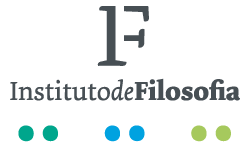Refrence: RG-502-2087 - Philosophy of Education and Contemporaneity
Principal investigator: Adalberto Dias de Carvalho
We also consider that the true vocation of a philosophy of education can thus be accomplished, which, even though coherently and consequently assuming its philosophical inclination, may provide educators in particular with a set of reflections which can lead them to develop an openness to the conflict which stems from the assumption Philosophical culture is a cornerstone in the "human works", in the practical anthropology that is education.
This Research Group, although rooted, as we have seen, in the contemporaneity of philosophy itself, is pioneering with regards to its interdisciplinary extensions and the clarification and application of its formative importance.
This Research Group constitutes the basis for the opportunity to shape a theoretical (philosophical) framework for the true transference of knowledge with relevant scientific relevance in the preparation of projects in several areas, such as, for example, in the socio-educational domain (reinterpretation of strategies and intergenerational and inclusion pedagogical devices, in curricular restructuring, in community intervention directed at target public) or in the socio-political domain (such us social inclusion or intercultural/religious dialogue).
The different subgroups: a) Human Rights, socio-educative intervention and its prepositions contemporary interpellations; b) Identity and alterity: ethic questioning and educative action and c) The Philosophy of Education on contemporaneity: the singular plural- although they may follow different paths of autonomous work, they are closely articulate in the pursuit of accomplishment the main goals described.
The principal activities for achieving our goals as well for dissemination of results follow the same pattern of previous years:
1. Publications that expand the body of theoretical work;
1.1. Individual and Collective Books and/or conference proceedings;
1.2. Publications in peer-review national and international journals;
1.3. National and international chapters in books, including contributions to conference proceedings.
1.4 Continuing the periodical publication of a journal – Itinerários de Filosofia da Educação. After 2015 this publication will be an online publication.
2. Organization of Scientific Meetings (national and international talks, seminars and conferences);
3. Training PhD and Master's students; training young researchers and students;
4. Resources for research (library, equipment, translations, services acquisition, computer equipment, digital materials, translations
5. Networking with other scientific communities and with similar projects, both nationally and internationally, in order to render the RG as a center of attraction to foreign graduated students;
6. National and international missions of researchers from RG (research or meetings), including consultants visits.
Objectives
From one survey on the perplexities that, facing education, pose to philosophy, from the very philosophy of education status to the human person identity on educational projects scope, passing through the questioning of the assumptions on human rights on an anthropological perspective, it arise other reflections that proceed a critical approach of really important aspects such as vulnerability, violence, hope, fallibility, intimacy or a reconfiguration of the individual status. These origins a set of reflections, raised by the confrontation of contemporaneity problematic with the challenges faced by education, when by education is meant as a fundament and expression of anthropological projects. The raised questions are of diverse nature, starting from the strictly anthropological scope, passing through the ethic and hermeneutics perspectives. The present project, which extends the accomplished research and achieved in previous projects is united by a common problematizing inspiration - that the education contemporary meanings don't match the meanings of contemporary education. These reflections require a quest about the meaning of human in the relational context of the world and the concept meanings. In other words, of the realities that they outline and the representations that it welcomes, disconnecting the contemporary meaning of post-modernity epistemological rhetoric.
The choice of the problematic that inspires this group elapsed, thereby, from concerns that merge in assumptions that contemporary imposes to itself on the face of conflict evidence and modernity impasse. On the specific field of education, the problematic at hand occupies such a prominent place as ignored by many of its theorists and practitioners. Even more because, in the case of the research line that underlies this project, its concerns focus on the specific field of philosophy of education, where the educational goals, as links of practical anthropology, enjoys a particularly sensitive and important to the affirmation and construction of the human status. It becomes evident the existence of several situations in what the human rights aren't present by prevailing an exception status and its consequent guaranties suspension. Even more generalized, seems to be the phenomenon designated by Foucault as biopolitics that, In the meantime, has intertwined with biopower, which means, with the human life's control through the technologies that are immense and tentacular.
From here follows a weakening of the logic that served the Human Rights grounding, which sat on the exemption and universality of Reason, that will replace religion and that configures as objective by resulting from a sovereign individual consciousness. It imposes, as an alternative to the created dead-lock, to Philosophy, the development of an anthropology of the relational person, in line of what Francis Jacques had proposed several years ago in his emblematic work Différence et Subjectivité, through a paradigm that allows to "set apart the consciousness of oneself subjectivity problem, to articulate it with the most person fundamental problem". It adopt, with that purpose and to overcome the individualist ideologies and the structuralist ideologies, a communicational approach in which one privileges dialogue and it's transcendental that is the relation of interlocution. This person philosophy should be, in our understanding, the philosophy that might bare the challenges that, contemporaneously poses to the human rights assumptions as long as they're understood, proprietarily as rights of the human person and, as such, as ethic principles.
